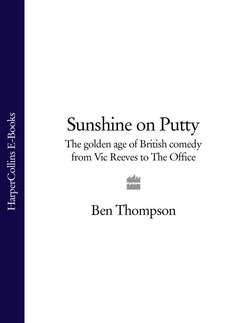Читать книгу Sunshine on Putty: The Golden Age of British Comedy from Vic Reeves to The Office - Ben Thompson, Ben Thompson - Страница 21
Hugh Greene was their valet
ОглавлениеMary Whitehouse used to credit Graham Greene’s brother, Sir Hugh Greene (Director General of the BBC from 1960 to 1969), with being ‘more responsible than any other single individual’ for what she perceived as the moral decline of that decade. Needless to say, Greene saw things differently. As a foreign correspondent for the Daily Telegraph he had reported of Hitler’s consolidation of power in 1930s Germany, and his personal experience of the ensuing moral abyss was the foundation of his own vision of the BBC as ‘a symbol of the liberation of the individual imagination’.
He took over determined to ‘clear away a certain amount of accumulated dust from what seemed…at the end of the fifties a rather stuffy institution, out of touch with the young and the rebellious, appealing to a rather narrow section of the public’. But Greene’s conviction that ‘To keep pace with the values of a changing world you have in fact to keep a bit ahead’39 was not going to endear him to everyone. And while it’s one thing to set an agenda, it’s another thing to keep to it.
When daring new programmes like That Was The Week That Was and Till Death Us Do Part prompted howls of protest from the same sections of society that would later fail to be amused by Chris Morris and his very brassy eye, Greene might easily have bowed to public pressure and taken them off the air. The fact that he didn’t40 would have far-reaching consequences. In fact, it is probably fair to say that without Sir Hugh’s steadfast refusal to countenance the objections of West Midlands primary-school teacher Mary Whitehouse and her ‘Clean Up TV campaign, the swinging sixties might never have got off the ground.
Describing Whitehouse and her ‘moral reformers’ as ‘dangerous to the whole quality of life in this country’, Greene did not just regard their activities as inimical to British traditions of freedom, tolerance and adventure. As someone determined to be ‘positively and actively on the side of the values [he] had seen being attacked and turned upside down in the previous decades in so many parts of the world, with the establishment either on the side of reaction against liberal values or too weak to resist their overthrow’, he saw born-again Christian campaigners like the Festival of Light as one step away from the Nazis.
The impact of the 1939-45 conflict on the history of comedy reached far beyond such celebrated post-war landmarks as The Goon Show and Hancock’s Half Hour and into the brave new world of the 1960s. But once you reach a generation of performers who are too young to remember the war at first hand, the situation inevitably changes.
With a very few honourable exceptions (notable alongside Dad’s Army in the annals of comedic self-respect is the last episode of Blackadder Goes Forth), most comedy about wartime written by people who didn’t live through it leaves the viewer with an uncomfortable suspicion that what is really being laughed about is the happy accident of birth which prevented those who are getting the laughs from having to go through this awful experience in real life.
In 2001, the strangely bitter and twisted second series of sketch show Big Train (which left Arthur Mathews – the milder-mannered half of the usually inspired scriptwriting duo Linehan and Mathews – holding the baby after his comedy compadre Graham Linehan decided to strike out on his own) contains a disproportionate amount of this sort of material. Nothing makes even the most left-leaning person yearn for the return of national service41 quite like the sight of a load of easy-living peacetime comic actors getting cheap laughs at the expense of people who risked their lives to fight evil.
What comedians generally say when subjected to this kind of accusation (taking their lead from the much-discussed Beyond The Fringe sketch ‘The Aftermyth of War’) is ‘it’s not actually about the war, it’s about the way the war has been represented’. But this defence is just as specious as Monty Python’s claims that The Life of Brian wasn’t actually taking the piss out of the Bible – ‘Brian was another prophet we made up…blah blah blah…You can see Jesus’s arm in scene 76 and it is treated very respectfully…blah blah blah’ – when everyone knows the fact that it was is the reason why it was funny.
